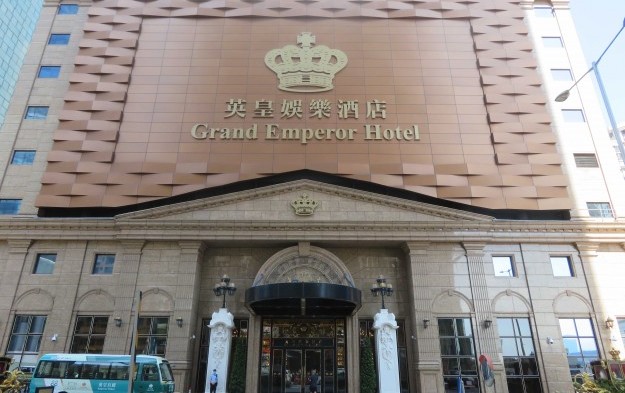Grand Emperor Hotel Macau ends satellite casino ops June 26
Apr 02, 2022 Newsdesk Latest News, Macau, Top of the deck

The Grand Emperor Hotel (pictured), a so-called “satellite” casino-hotel in downtown Macau, is to cease gaming operations on June 26. It “retains” the hotel business, said its promoter, Hong Kong-listed Emperor Entertainment Hotel Ltd, in a filing on Friday night.
The casino is run under a service agreement with Macau casino operator SJM Holdings Ltd, and the current deal is due to expire on that date.
The Grand Emperor Hotel launched as a casino-hotel in 2006, and was started by Albert Yeung Sau Shing, founder of Emperor International Holdings Ltd, and a long-time business associate of former Macau gaming monopolist Stanley Ho Hung Sun, creator of SJM Holdings.
The decision has now been taken to cease the casino operation at Grand Emperor Hotel “considering the gloomy outlook of the high-end gaming segment,” and also due to the “tough business operating environment arising from the Covid-19 pandemic over the past two years, which resulted in the segment losses of the group for both the year ended 31 March 2021 and the six months ended 30 September 2021”.
The firm – which also runs the non-gaming Inn Hotel Macau in the Taipa district of Macau – recorded a HKD84.0-million (US$10.7-million) loss in the six months to September 30, according to its interim results filed on December 10. Such interim loss was nonetheless narrowed from HKD141.8 million for the interim period in 2020.
As of September 30, 2021, the Grand Emperor Hotel had 311 guest rooms, and casino facilities with 67 mass-market gaming tables, 180 slot machines, and a self-managed VIP room with 10 tables.
Gaming biz up in 1H
In that period, revenue from the mass tables had actually increased 191.9 percent year-on-year, to HKD108.6 million, and accounted for 72.5 percent of total gaming revenue.
Revenue from the VIP room had increased 426.7 percent, to HKD31.6 million. Slot revenue had grown by 20.3 percent year-on-year, to HKD9.5 million.
The group – which also has non-gaming business in Hong Kong – had a total of 869 employees as of September 30.
The company said that it had taken the decision to cease Macau gaming operations in the best interests of the company and the shareholders, but nonetheless retained a “strong and stable’ financial position, with HKD940 million in bank balances and cash, as of September 30.
“Given the strategic position of Hong Kong and Macau within the [Guangdong-Hong Kong-Macau] Greater Bay Area, the board is positive towards the outlook of the hospitality sector in the long run after the easing of the anti-pandemic measures,” the firm stated.
Late last month, Chinese-language media outlet Macao Daily News reported, citing sources it did not identify, that at least seven Macau satellite casinos – nearly 40 percent of such properties currently active in the local market – might withdraw from the sector by mid-year.
Macau satellites are venues controlled by independent investors, but must piggyback on the gaming licence of an existing casino concessionaire.
The new regulatory requirements mulled for Macau satellite casino operators – as mentioned in the city’s gaming law amendment bill – say satellites will still be permitted to run in the local market. But they will each be given a three-year grace period to tie the ownership of their gaming premises to any of the six concessionaires that will be permitted to serve the Macau market within the next decade.
The bill is currently under review, with the final version likely to be voted o by the Legislative Assembly in June.
Macau’s VIP gambling trade has seen a decline in business in recent years. The trend accelerated in the junket-managed – rather than house-managed – portion of the segment, with the November detention of Alvin Chau Cheok Wa, on suspicion of promoting cross-border gambling overseas to mainland China customers, and the cessation of business at his junket brand Suncity Group.
In January this year, the VIP trade saw the arrest of Levo Chan Weng Lin, boss of junket brand Tak Chun, on suspicion of being a triad leader.
Related articles
-
 Macau mass-market GGR flat sequentially...
Macau mass-market GGR flat sequentially...Jul 16, 2024
-
 Early July Macau GGR down 12pct on...
Early July Macau GGR down 12pct on...Jul 09, 2024
More news
-
 Donaco EBITDA up y-o-y to above US$4mln...
Donaco EBITDA up y-o-y to above US$4mln...Jul 26, 2024
-
 HK listed Palasino upgrades Czech...
HK listed Palasino upgrades Czech...Jul 26, 2024
Latest News
Jul 26, 2024
Border-casino operator Donaco International Ltd has achieved a 164.17-percent year-on-year increase in its latest quarterly group earnings before interest, taxation, depreciation and amortisation...Sign up to our FREE Newsletter
 (Click here for more)
(Click here for more)
Pick of the Day
”We’ve got more traction outside of Macau at the moment. But Macau’s going be a bigger focus for us”
David Punter
Regional representative at Konami Australia
Most Popular
 Sheraton brand to exit Londoner Macao, to be Londoner Grand July 25, 2024
Sheraton brand to exit Londoner Macao, to be Londoner Grand July 25, 2024  Macau regulator probes unlicensed gaming agents July 24, 2024
Macau regulator probes unlicensed gaming agents July 24, 2024  Philippines gives 20k aliens in POGOs 60 days to leave July 25, 2024
Philippines gives 20k aliens in POGOs 60 days to leave July 25, 2024  Philippines-listed DigiPlus says not affected by POGO ban July 24, 2024
Philippines-listed DigiPlus says not affected by POGO ban July 24, 2024  Sands China 2Q EBITDA down q-o-q amid low hold, renovation July 25, 2024
Sands China 2Q EBITDA down q-o-q amid low hold, renovation July 25, 2024






